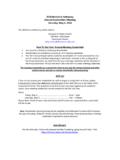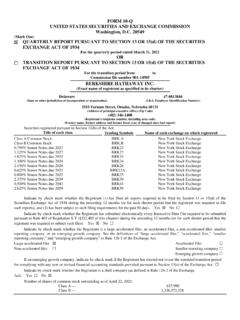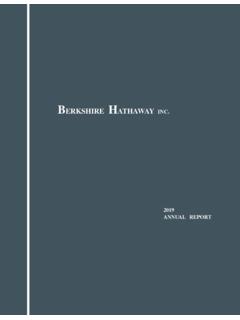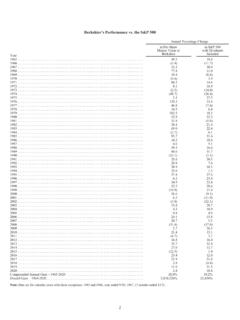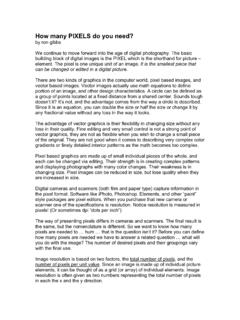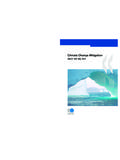Transcription of 77048 Americas Growing - BERKSHIRE HATHAWAY …
1 FORTUNE. NOVEMBER 10, 2003. America's Growing Trade Deficit Is Selling the Nation Out From Under Us. Here's a Way to Fix the Problem And we need to Do It Now. by Warren E. Buffett I'M ABOUT TO DELIVER A WARNING regarding the trade deficit and also suggest a remedy for the problem. But first I need to mention two reasons you might want to be skeptical about what I say. To begin, my forecasting record with respect to macroeconomics is far from inspiring. For example, over the past two decades I was excessively fearful of inflation. More to the point at hand, I started way back in 1987 to publicly worry about our mounting trade deficits and, as you know, we've not only survived but also thrived. So on the trade front, score at least one wolf for me. Nevertheless, I am crying wolf again and WA R R E N B U F F E T T.
2 This time backing it with BERKSHIRE Hath- away's money. Through the spring of Truth and consequences 2002, I had lived nearly 72 years without purchasing a foreign currency. Since then Facing up to the effects of our trade imbalance BERKSHIRE has made significant invest- ments in and today holds several cur- $0 rencies. I won't give you particulars; in fact, it is largely irrelevant which curren- cies they are. What does matter is the un- TRADE. SURPLUS/DEFICIT derlying point: To hold other currencies is to believe that the dollar will decline. $100 Both as an American and as an in- billion vestor, I actually hope these commit- ments prove to be a mistake. Any prof- its BERKSHIRE might make from currency trading would pale against the losses the $200 company and our shareholders, in other Huge and Growing aspects of their lives, would incur from trade deficits a plunging dollar.
3 But as head of BERKSHIRE HATHAWAY , I. am in charge of investing its money in $300 ways that make sense. And my reason for finally putting my money where my mouth has been so long is that our trade deficit has greatly worsened, to the point that our country's net worth, so to $400 speak, is now being transferred abroad at an alarming rate. 1950 1960 1970 1980 1990 2000. perpetuation of this trans- A. 2003. FORTUNE fer will lead to major trou- estimate ble. To understand why, take a wildly fanciful trip with me to two isolated, $0 side-by-side islands of equal size, Squan- derville and Thriftville. Land is the only NET capital asset on these islands, and their INTERNATIONAL communities are primitive, needing only INVESTMENT food and producing only food. Work- $500 ing eight hours a day, in fact, each in- holdings of foreign assets billion minus foreign holdings of assets* habitant can produce enough food to FORTUNE GRAPHIC / SOURCE: BUREAU OF ECONOMIC ANALYSIS, DEPARTMENT OF COMMERCE.
4 Sustain himself or herself. And for a long time that's how things go along. On each island everybody works the prescribed $1. trillion eight hours a day, which means that each are inevitably putting society is self-sufficient. Eventually, though, the industrious an ever larger slice of citizens of Thriftville decide to do some America in foreign hands $ serious saving and investing, and they start to work 16 hours a day. In this mode they continue to live off the food they produce in eight hours of work but be- gin exporting an equal amount to their $2. one and only trading outlet, Squan- derville. The citizens of Squanderville are ec- static about this turn of events, since $ they can now live their lives free from toil but eat as well as ever. Oh, yes, 1950 1960 1970 1980 1990 2000 6/03.
5 FORTUNE there's a quid pro quo but to the estimate Squanders, it seems harmless: All that *Data for 1976 and later years are not strictly comparable with pre-1976 data. the Thrifts want in exchange for their WA R R E N B U F F E T T. food is Squanderbonds (which are denominated, naturally, in Squanderbucks). Through the spring of 2002, I had lived Over time Thriftville accumulates an enor- mous amount of these bonds, which at their core nearly 72 years without purchasing represent claim checks on the future output of a foreign currency. That has changed. Squanderville. A few pundits in Squanderville smell trouble coming. They foresee that for the Squanders both 1970. In those days, to sum up, our country's net worth, viewed to eat and to pay off or simply service the debt they're piling in totality, consisted of all the wealth within our borders plus a up will eventually require them to work more than eight hours a modest portion of the wealth in the rest of the world.
6 Day. But the residents of Squanderville are in no mood to listen Additionally, because the was in a net ownership position to such doomsaying. with respect to the rest of the world, we realized net investment Meanwhile, the citizens of Thriftville begin to get nervous. income that, piled on top of our trade surplus, became a second Just how good, they ask, are the IOUs of a shiftless island? So source of investable funds. Our fiscal situation was thus similar the Thrifts change strategy: Though they continue to hold some to that of an individual who was both saving some of his salary bonds, they sell most of them to Squanderville residents for and reinvesting the dividends from his existing nest egg. Squanderbucks and use the proceeds to buy Squanderville In the late 1970s the trade situation reversed, producing deficits land.
7 And eventually the Thrifts own all of Squanderville. that initially ran about 1% of GDP. That was hardly serious, par- At that point, the Squanders are forced to deal with an ugly ticularly because net investment income remained positive. In- equation: They must now not only return to working eight deed, with the power of compound interest working for us, our hours a day in order to eat they have nothing left to trade but net ownership balance hit its high in 1980 at $360 billion. must also work additional hours to service their debt and pay Since then, however, it's been all downhill, with the pace of de- Thriftville rent on the land so imprudently sold. In effect, Squan- cline rapidly accelerating in the past five years. Our annual trade derville has been colonized by purchase rather than conquest.
8 Deficit now exceeds 4% of GDP. Equally ominous, the rest of It can be argued, of course, that the present value of the fu- the world owns a staggering $ trillion more of the than ture production that Squanderville must forever ship to Thrift- we own of other countries. Some of this $ trillion is invested ville only equates to the production Thriftville initially gave up in claim checks bonds, both governmental and private . and that therefore both have received a fair deal. But since one and some in such assets as property and equity securities. generation of Squanders gets the free ride and future generations In effect, our country has been behaving like an extraordinarily pay in perpetuity for it, there are in economist talk some rich family that possesses an immense farm. In order to consume pretty dramatic intergenerational inequities.
9 4% more than we produce that's the trade deficit we have, Let's think of it in terms of a family: Imagine that I, Warren day by day, been both selling pieces of the farm and increasing Buffett, can get the suppliers of all that I consume in my life- the mortgage on what we still own. time to take Buffett family IOUs that are payable, in goods and To put the $ trillion of net foreign ownership in perspec- services and with interest added, by my descendants. This sce- tive, contrast it with the $12 trillion value of publicly owned nario may be viewed as effecting an even trade between the Buf- stocks or the equal amount of residential real estate fett family unit and its creditors. But the generations of Buffetts or what I would estimate as a grand total of $50 trillion in na- following me are not likely to applaud the deal (and, heaven for- tional wealth.)
10 Those comparisons show that what's already bid, may even attempt to welsh on it). been transferred abroad is meaningful in the area, for exam- Think again about those islands: Sooner or later the Squan- ple, of 5% of our national wealth. derville government, facing ever greater payments to service debt, More important, however, is that foreign ownership of our as- would decide to embrace highly inflationary policies that is, is- sets will grow at about $500 billion per year at the present sue more Squanderbucks to dilute the value of each. After all, trade-deficit level, which means that the deficit will be adding the government would reason, those irritating Squanderbonds about one percentage point annually to foreigners' net owner- are simply claims on specific numbers of Squanderbucks, not on ship of our national wealth.

